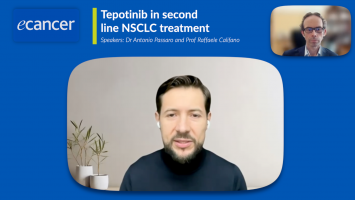What have you been doing in this study?
It is a very large study done in the second line setting for patients with advanced non-small cell lung cancer. We have to remind that for these patients the outcome is very poor - response rate consistently less than 10%, PFS below 3 months and median survival from approximately 7-9 months, that’s in the context of the trial.
What is ramucirumab? What does it do?
Ramucirumab is a monoclonal antibody, an anti-angiogenic agent; it targets the VEGF receptor 2 on endothelial cells and so it can inhibit the formation of new blood vessels and so it can inhibit the tumour growth.
Does that mean it only works in certain patients?
We have still to define who are the patients who will benefit most from this drug. We have a large biomarker programme in this study which is running now but we have not the answer, but we are trying to identify the patients who can benefit most. But, in a clinical way, most subgroups of patients benefit from ramucirumab in our trial.
What did you find in your study?
We tried to assess the impact of the addition of ramucirumab to the standard second line treatment with docetaxel. So it was a randomised trial comparing ramucirumab plus docetaxel versus placeboplus docetaxel. We found that the addition of ramucirumab significantly improved the overall survival for patients with a median survival of 10.5 months compared to 9.1 months in the control arm. Also, we saw that the addition of ramucirumab consistently improved the response rate from 14% to 23% and the median PFS also from 3 months to 4.5 months.
What kind of prospect do these patients face normally?
In the routine clinical practice patients treated with single agent second line treatment have a very poor outcome. The response rate is consistently below 10%, the median PFS is around 2 or 3 months and the median overall survival from 7 to 9 months in the best trials. So the outcome is very poor and there is a large unmet medical need. We made no advances in this field since a decade.
What are the clinical implications of your study?
Ramucirumab is not approved in this indication today so I think we will see if it will be approved. But it’s a step forward for patients in second line setting and, as a clinician, I think the ability of a new agent to improve response rates, progression free survival and overall survival for the first time since 2005 is a significant advance for patients.
What is the key message for cancer doctors from your findings?
The key message is that this is the first... the REVEL study is the first study to demonstrate a significant survival advantage in second line therapy of patients with advanced non-small cell lung cancer, also, in both histologic subtypes, squamous and non-squamous.








